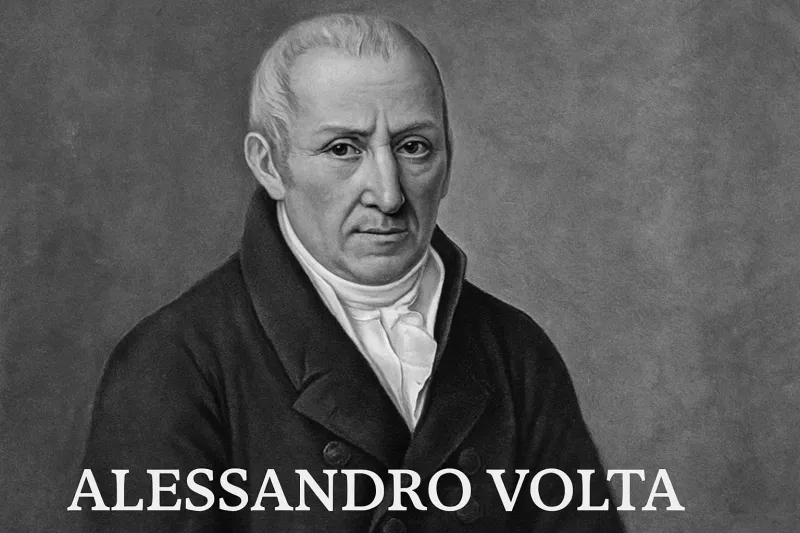Short Summary
Alessandro Volta (1745–1827) was a pioneering Italian physicist and chemist, most famous for inventing the electric battery. His invention of the Voltaic Pile provided the first continuous source of electric current, laying the groundwork for the future of electrical science and technology. The unit of electric potential, the volt (V), is named in his honor, reflecting his monumental contributions to the field.
Early Life & Education
Alessandro Giuseppe Antonio Anastasio Volta was born on February 18, 1745, in Como, Italy. Though his family hoped he would enter the priesthood, Volta showed a natural inclination towards science from an early age. By the age of 14, he had decided to pursue physics. He attended the Como Jesuit School and later became a physics professor at the Royal School of Como in 1774. His early work focused on the study of gases and electricity.
Career Highlights
Volta's early fame came from his discovery of methane gas and his invention of the electrophorus, a device that generated static electricity. However, his most significant contribution came in 1800 when he invented the Voltaic Pile, the first device capable of producing a steady electric current. This invention triggered rapid advancements in electromagnetism and electrochemistry. Volta was appointed to prestigious positions, including as a professor at the University of Pavia, and received honors from Napoleon Bonaparte.
Major Achievements
- Invented the Voltaic Pile (1800), the first chemical battery. - Discovered methane and studied gas properties. - Invented the electrophorus for generating static electricity. - Honored with the title of Count of Lombardy by Napoleon. - The volt (V) was named after him in 1881 by the International Electrical Congress.
Famous Quotes
“You must be ready to give up even the most attractive ideas when experiment shows them to be wrong.”
“Electricity will do for the world what the steam engine has done.”
“Progress in science depends on new techniques, new discoveries and new ideas, probably in that order.”
Interesting Facts
- Volta's invention directly led to the development of electrochemistry. - Napoleon Bonaparte was fascinated by Volta’s work and made him a Count. - Volta retired in 1819 to his hometown of Como, where he died in 1827. - His face appeared on the Italian 10,000 lira banknote. - Despite his scientific achievements, Volta remained deeply religious throughout his life.
Legacy / Influence
Alessandro Volta’s work revolutionized science by providing the first continuous electrical current source, paving the way for future discoveries in electromagnetism, electrochemistry, and electrical engineering. His influence extended far beyond physics, impacting technology, industry, and daily life through the development of batteries and electrical systems. His name endures through the volt, a fundamental unit of measurement in electricity, symbolizing his lasting impact on the world.
FAQ
Q: What is Alessandro Volta most famous for?A: He is best known for inventing the Voltaic Pile, the first electric battery. Q: Why is the unit "volt" named after him?
A: In recognition of his contributions to electrical science, the volt was named in his honor in 1881. Q: Did Alessandro Volta work with other famous scientists?
A: He corresponded with prominent scientists of his time, including Luigi Galvani, whose work indirectly inspired Volta’s own. Q: Where can you see tributes to Alessandro Volta today?
A: Museums in Como, Italy, are dedicated to his life, and his name is honored in scientific units and institutions worldwide. Q: What impact did Volta’s invention have on science?
A: His battery enabled countless discoveries in physics and chemistry and laid the foundation for modern electrical technology.













